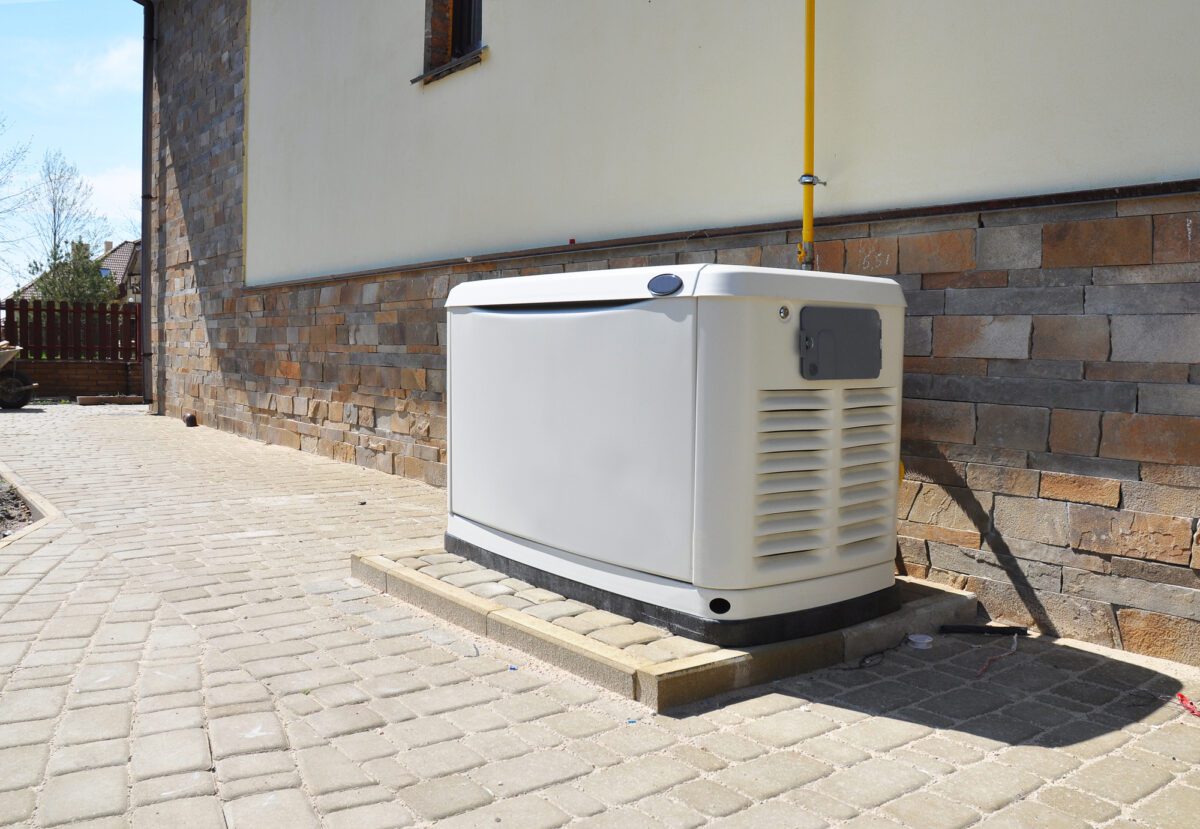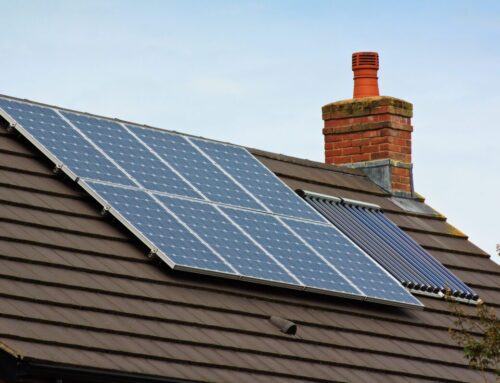In today’s increasingly electricity-dependent world, having reliable backup power solutions like home batteries and home generators is crucial, especially in emergencies. With battery systems becoming more advanced and affordable, homeowners can now have peace of mind knowing they have a backup power source readily available. To learn more about home batteries and generators, visit energysage. Whether it’s for powering essential appliances during a blackout or ensuring uninterrupted functionality in critical cases, home batteries and home generators, also known as battery systems and home standby gens, play a vital role. This article focuses on comparing two popular choices for backup power during a power outage: home batteries and traditional generators. With the increasing popularity of home batteries, many homeowners are considering this alternative to traditional generators. Energysage provides valuable information and resources for those interested in exploring the benefits of home batteries.
Both home batteries and generators backups have their own unique features and working mechanisms. When there is a power outage, having home batteries can be a reliable solution to keep essential appliances running. According to EnergySage, home batteries are becoming increasingly popular for their ability to store electricity and provide backup power during outages. Home backup battery systems, such as the IQ Battery, are essential for providing electrical energy to power devices during a power outage. These systems serve as reliable alternatives to backup generators and home standby gens. On the other hand, generators use fuel-powered engines to run and generate electricity for home backup battery systems. Each option comes with its own set of pros and cons in terms of capacity, noise levels, and incentives for cordial hospitality at home or in commercial settings. Additionally, users can reply to comments and engage in discussions, while the number of upvotes determines the popularity of a post. It is important to have a reliable backup battery system to ensure uninterrupted power supply during power outages or when on the run.
Understanding the differences between battery and generator backups will help you make an informed decision based on your specific requirements and quality needs. Whether you need a backup power source to run your devices during outages, or want to ensure your system receives enough upvotes for optimal performance, it’s important to consider the options available. Additionally, being able to quickly reply to any power-related issues can save you time and prevent potential damage. Join us as we delve into the intricacies of home standby generators and fossil fuel generators and explore which one means better reliability for your power needs. Which backup solution will run longer during a power outage? Which one will receive more upvotes from homeowners seeking a reliable power source? Let’s find out.
Understanding Backup Power Solutions
Definition and Purpose of Backup Power Solutions
Backup power solutions, such as fossil fuel generators, are essential systems that run and provide electricity during power outages or emergencies when the main power source is unavailable. These systems ensure that you have a reliable source of power to keep your home or business running smoothly. In case of any questions or comments, feel free to leave a reply or give it an upvote. These systems act as a reliable backup to ensure uninterrupted power supply for critical appliances, devices, or even entire buildings. They are designed to handle power outages and receive upvotes from users. The purpose of backup power solutions is to maintain functionality and prevent disruptions in various settings such as homes, offices, hospitals, data centers, and other important facilities. These solutions are crucial for ensuring uninterrupted power supply and receiving upvotes from users.
Different Types of Backup Power Systems Available
There are several types of backup power systems available to cater to different needs and requirements. Some of these systems may require upvotes.
- Battery Backup Systems: Battery backups utilize rechargeable batteries to store electrical energy. When the main power source fails, these home backup battery systems and backup generators automatically kick in and provide electricity for a limited period. Backup generators are commonly used for smaller-scale applications like home appliances, computers, or small businesses.
- Generators: Generators are standalone devices that generate electricity using an internal combustion engine powered by fuel, such as gasoline or diesel. Home backup batteries are not included in this category. They can provide continuous power for extended periods depending on their fuel capacity. Generators, the ideal home backup power solution, come in various sizes and capacities, making them suitable for both residential and commercial use.
- Uninterruptible Power Supply (UPS): UPS systems combine battery technology with an automatic voltage regulator (AVR). They offer immediate protection against power fluctuations and outages by providing seamless transition from grid power to battery backup within milliseconds. UPS systems, which serve as a reliable home backup power solution, are widely used in critical applications such as computer servers, medical equipment, and telecommunications infrastructure.
- Solar Power Systems: Solar power systems harness energy from the sun through photovoltaic panels installed on rooftops or open spaces. These systems convert sunlight into electricity using solar inverters and can be integrated with battery storage to provide backup power during cloudy days or at night.
Factors to Consider When Choosing a Backup Power Solution
When selecting a backup power solution, it’s crucial to consider the following factors:
- Power Requirements: Determine the total power consumption of the appliances or devices that need backup power. This will help determine the capacity and type of backup power system required.
- Duration of Backup Power: Evaluate how long you need backup power to last during an outage. Battery backups typically provide shorter durations, while generators can offer longer periods of continuous power.
- Cost and Maintenance: Consider the initial cost, installation charges, fuel requirements (for generators), and ongoing maintenance expenses associated with each backup power solution.
- **
Comparing Backup Batteries and Generators
Distinct Differences between Backup Batteries and Generators
Backup batteries and generators are two popular options for providing emergency power in times of need. While they both serve the same purpose, there are distinct differences between the two.
One key difference is the way they generate power. Backup batteries store electrical energy when connected to a power source, such as solar panels or the grid, and release it when needed. On the other hand, home backup power solutions like generators produce electricity by burning fuel, typically gasoline or propane.
Another significant difference is their portability. Backup batteries are generally compact and lightweight, making them easy to move around or take with you on camping trips or outdoor adventures. They can also be installed indoors for home backup power. In contrast, home generators tend to be larger and require a dedicated space outdoors due to their exhaust emissions.
Pros and Cons of Using Backup Batteries for Emergency Power
Using backup batteries for emergency power has its advantages and disadvantages.
One major advantage is that backup batteries provide clean energy without any noise or emissions since they don’t burn fuel like generators do. This makes them suitable for indoor use and an ideal home backup power solution, while also being environmentally friendly. Modern backup battery systems often come with smart features that allow you to monitor your energy usage and optimize efficiency.
However, backup batteries have limitations. Their capacity is limited by the amount of stored energy they hold, which means they may not be able to sustain power for an extended period if there isn’t enough sunlight (in the case of solar-powered batteries) or if there’s excessive demand during an outage.
Pros and Cons of Using Generators for Emergency Power
Generators have been a traditional choice for emergency power due to their ability to provide a continuous supply of electricity over an extended period.
One advantage of using generators is their high power output capability. They can handle heavy loads, making them suitable for running multiple appliances simultaneously or powering larger equipment. Generators are readily available and can be fueled up quickly during an emergency.
However, generators come with some drawbacks as well. They require a constant supply of fuel to operate, which means you need to keep enough fuel on hand to sustain them. Generators also produce noise and emissions, which may not be ideal for indoor use or in areas where noise restrictions apply.
Installation and Setup for Emergency Power
Installing Backup Batteries for Emergency Power
Installing backup batteries for emergency power involves several important steps to ensure a reliable and efficient setup.
Firstly, it is crucial to determine the power requirements of your essential appliances during a power outage. Make a list of the devices you want to keep running and calculate their total power consumption. This will help you choose the appropriate battery capacity.
Next, select an ideal location for your backup battery system. It should be easily accessible and well-ventilated to prevent overheating. Consider placing it close to your main electrical panel for easier wiring.
Once you have chosen the location, install the backup battery system according to the manufacturer’s instructions. This typically involves mounting the batteries securely and connecting them to an inverter or charge controller. Ensure that all connections are tight and secure.
After installation, it is essential to wire your backup battery system correctly. This may involve connecting it directly to specific circuits or installing a transfer switch that automatically switches between grid power and battery backup during an outage.
Lastly, don’t forget about safety measures during installation. Follow electrical safety guidelines, such as turning off the main breaker before making any connections, using proper grounding techniques, and avoiding contact with live wires.
Setting Up Generators for Emergency Power
Setting up generators as a backup power source requires careful consideration of various factors to ensure safe operation.
Begin by selecting an appropriate generator size based on your power needs during an outage. Consider both starting watts (the initial surge required by certain appliances) and running watts (the continuous power needed). Oversizing or undersizing can lead to inefficiency or potential damage.
Choose a suitable location for your generator installation that allows proper ventilation while keeping it protected from harsh weather conditions. Remember that generators emit carbon monoxide gas, so they should never be placed indoors or near open windows/doors.
Proper fuel storage is crucial when using generators. Follow local regulations for fuel storage and ensure you have a sufficient supply to last through potential power outages.
During installation, connect your generator to your home’s electrical panel using a transfer switch or interlock device. This will prevent backfeeding, which can be dangerous for utility workers and damage appliances when the power is restored.
Once the generator is connected, start it up periodically to ensure it runs smoothly and performs regular maintenance as recommended by the manufacturer. This includes checking oil levels, cleaning filters, and inspecting spark plugs.
Maintenance of Backup Power Systems
Regular maintenance is crucial for ensuring the optimal performance and reliability of backup power systems, whether they are battery backups or standby generators. By taking proactive measures to maintain these systems, you can be confident that they will be ready to provide power during unexpected outages.
Importance of regular maintenance for backup batteries and generators
Both battery backup systems and standby generators require regular maintenance to keep them in good working condition. For battery backup systems, it is essential to monitor the health of the batteries and ensure they are charging properly. Regular inspections can help identify any signs of wear or damage that may affect their performance.
Similarly, standby generators need routine maintenance to ensure their engines are functioning correctly. This includes checking oil levels, air filters, and spark plugs regularly. Neglecting these tasks can lead to decreased efficiency or even failure when you need the generator most.
Key maintenance tasks for ensuring optimal performance of backup systems
To maintain your battery backup system effectively, there are several key tasks you should prioritize:
- Battery inspections: Regularly check the condition of your batteries, looking for signs of corrosion or leakage. Clean any buildup on terminals and ensure a secure connection.
- Battery testing: Perform routine tests on your batteries to assess their capacity and overall health. This will help identify if any replacements are necessary before an outage occurs.
- Charging system: Monitor the charging system of your battery backup system to ensure it is functioning correctly. Verify that the charger is delivering an appropriate charge voltage and current.
For standby generators, consider these important maintenance tasks:
- Oil changes: Change the oil at regular intervals as recommended by the manufacturer’s guidelines. Fresh oil helps lubricate the engine components properly.
- Air filter replacement: Replace dirty or clogged air filters promptly to maintain proper airflow into the generator’s engine.
- Spark plug inspection: Check spark plugs regularly for signs of wear or damage. Replace them if necessary to ensure reliable ignition.
Tips for troubleshooting common issues with backup power solutions
Even with regular maintenance, backup power systems can experience issues. Here are a few troubleshooting tips:
- Battery backups: If your battery backup system is not providing power during an outage, check the connections and ensure the batteries are charged. Consider testing individual batteries to identify any faulty ones that may need replacement.
- Standby generators
Cost Analysis of Backup Options
Factors Influencing the Cost of Backup Batteries and Generators
When considering backup power options, it is essential to analyze the costs associated with both batteries and generators. Several factors influence the overall cost of these backup solutions.
Firstly, the upfront costs play a significant role. Battery backups typically require purchasing batteries, inverters, charge controllers, and other necessary components. On the other hand, generators involve buying the generator itself along with any additional wiring or installation requirements.
Another factor to consider is operational expenses. Batteries require regular maintenance, such as checking electrolyte levels and replacing worn-out cells. Battery backups may need periodic replacement due to limited lifespan. In contrast, generators necessitate fuel or energy sources like gasoline or propane for operation.
Comparison of Upfront Costs, Operational Expenses, and Long-Term Savings
When comparing upfront costs between batteries and generators, batteries tend to be more expensive initially due to the need for various components. However, this cost can vary depending on factors such as battery capacity and brand.
On the other hand, while generators may have lower upfront costs compared to batteries in some cases, they come with their own set of expenses. Fuel costs can add up over time if you frequently rely on a generator for extended periods during power outages.
Considering long-term savings is crucial when choosing a backup power solution. Battery backups have an advantage here since they can be charged using renewable energy sources like solar panels. This allows users to save money on electricity bills in the long run by relying on clean and sustainable power.
Generators may provide immediate power during outages but do not offer long-term savings unless alternative fuels are used (such as biodiesel). Generator maintenance costs should be factored into long-term expenses.
Consideration of Return on Investment When Choosing a Backup Power Solution
Return on investment (ROI) is an essential aspect to consider when deciding between batteries and generators. While batteries have higher upfront costs, their long-term savings potential through reduced electricity bills can lead to a favorable ROI over time.
Generators, on the other hand, offer immediate power during outages but may not provide significant long-term savings unless alternative energy sources are utilized. It is essential to calculate the estimated payback period and compare it with the expected lifespan of the backup solution.
Advantages of Backup Batteries Over Generators
Increased Efficiency, Portability, and Environmental Friendliness
Backup batteries offer unique benefits compared to generators. One major advantage is their increased efficiency. Unlike generators that rely on combustion engines to convert fuel into electricity, battery backups store energy in chemical form and convert it directly into electrical power. This direct conversion process eliminates the energy loss associated with fuel combustion, resulting in higher overall efficiency.
In addition to efficiency, battery backups are also highly portable. They are compact and lightweight, making them easy to transport and install in various locations. Whether you need backup power for your home during a blackout or for outdoor activities like camping or tailgating, battery backups provide a convenient solution. You can easily carry them wherever you go without the hassle of dealing with heavy machinery or complex setups.
Another significant advantage of battery backups is their environmental friendliness. As solar batteries become more popular, they contribute to reducing reliance on fossil fuels and decreasing carbon emissions. Solar batteries harness renewable energy from the sun and store it for later use, eliminating the need for traditional generators that rely on non-renewable resources like gasoline or diesel.
Noise Reduction, Scalability, and Ease of Use
Noise reduction is another notable benefit offered by battery backups over generators. Generators tend to produce loud noises due to their internal combustion engines. On the other hand, battery backups operate silently since they don’t rely on any mechanical parts or combustible fuels. This feature makes them ideal for residential areas where noise pollution can be a concern.
Scalability is another advantage that battery backups possess. While generators come in different sizes based on their power output capacity, expanding their capacity requires additional units or larger models. In contrast, battery backup systems can be easily scaled up by adding more batteries as needed without requiring significant changes to the existing setup.
Ease of use is yet another factor that sets battery backups apart from generators. Generators often require regular maintenance, such as oil changes and spark plug replacements. Battery backups, on the other hand, are virtually maintenance-free. Once installed, they operate automatically without the need for constant monitoring or upkeep.
Addressing Fuel Supply and Power Load Requirements
During emergencies, fuel supply can pose significant challenges for generator backups. The availability of fuel sources, such as natural gas or diesel, may be limited or disrupted, making it difficult to sustain power generation. This can lead to prolonged periods without electricity, affecting critical loads and essential services.
Managing power load requirements is crucial when considering the capacity of backup batteries or generators. It is essential to assess the energy demands and determine if the backup system can handle the necessary loads during an outage. By understanding the power load requirements, you can ensure that your backup solution is capable of meeting your needs.
Extended power outages require careful consideration of varying energy demands. Different situations may call for different approaches in managing power load requirements. For instance, during a short-term outage, a battery backup system might be sufficient to provide power for critical loads like medical equipment or communication devices. However, in cases where the outage lasts for an extended period or there are higher energy demands, a generator backup system with a larger capacity may be necessary.
Fuel costs and availability play a significant role in determining the feasibility of using generators as backup systems. Fossil fuel generators rely on fuels like gasoline, diesel, or propane to generate electricity. The cost and accessibility of these fuels need to be considered when deciding on a generator backup solution.
Dual fuel generators offer flexibility by allowing the use of multiple fuel sources such as gasoline and propane. This versatility can help mitigate potential issues related to fuel availability during emergencies.
Renewable energy sources present an alternative option for powering critical loads during outages. Solar panels coupled with battery storage systems can provide sustainable and reliable backup power without relying on fossil fuels. However, it’s important to consider factors like weather conditions and available sunlight when relying solely on renewable energy sources.
When evaluating power load requirements and fuel supply options for generator backups, it’s also crucial to consider safety measures such as proper ventilation and storage of fuel. Gas lines or propane tanks should be inspected regularly to ensure their integrity and prevent any potential hazards.
Longevity and Efficiency of Backup Solutions
Lifespan Expectations for Different Types of Backup Batteries and Generators
Backup power solutions, such as batteries and generators, play a crucial role in ensuring uninterrupted electricity supply during outages. Understanding the lifespan expectations of these backup systems is essential for making informed decisions.
Their longevity can vary depending on the type. Lead-acid batteries, commonly used in backup systems, typically have a lifespan of around 3-5 years. On the other hand, lithium-ion batteries offer a longer lifespan of approximately 10-15 years. It’s important to consider this difference when choosing a battery storage system.
Generators, on the other hand, can last significantly longer than batteries if properly maintained. Diesel generators are known for their durability and can operate reliably for up to 30 years or more with regular servicing. Natural gas generators also have a long lifespan, often exceeding 20 years.
Factors Affecting the Efficiency and Performance of Backup Power Systems
Several factors can impact the efficiency and performance of backup power systems. One crucial factor is maintenance. Regularly inspecting and servicing your backup system ensures optimal performance and extends its lifespan.
Another factor to consider is the load capacity of your backup solution. Understanding your power requirements during an outage will help you choose a generator or battery with sufficient capacity to meet those needs. Overloading a backup system can lead to inefficiencies and potential damage.
The quality of components used in your backup solution also plays a significant role in its efficiency and performance. Investing in high-quality batteries or generators with reputable brands may result in better reliability and longevity.
Furthermore, environmental conditions can affect how well your backup system operates. Extreme temperatures or humidity levels may impact battery performance or generator efficiency over time. Proper ventilation and temperature control measures should be implemented to mitigate these effects.
Tips for Maximizing the Longevity and Efficiency of Backup Solutions
To maximize the longevity and efficiency of your backup solution, consider the following tips:
- Regular maintenance: Follow manufacturer guidelines for maintenance schedules and perform routine inspections to identify any issues early on.
- Proper ventilation: Ensure that your backup system has adequate airflow to prevent overheating and optimize performance.
- Correct sizing: Choose a battery or generator that matches your power requirements, avoiding overloading or underutilizing the system.
Choosing the Appropriate Backup Power for Your Home
Factors to Consider When Selecting a Backup Power Solution for Residential Use
There are several factors that you need to take into consideration. Assessing your power needs, available space, and budget constraints will help you make an informed decision.
One of the first things you should consider is the amount of power your home requires during an outage. Evaluate which appliances and systems are essential for your daily life and prioritize them accordingly. This assessment will give you a better understanding of the capacity needed for your backup power solution.
Next, consider the available space in your home. Different backup power solutions have varying footprints, so it’s important to choose one that fits within your designated area. For example, if you have limited space, a compact home battery backup system may be more suitable than a larger generator.
Budget constraints are another crucial factor to keep in mind. Determine how much you are willing to invest in a backup power solution and explore options that align with your financial resources. It’s worth noting that while generators often have lower upfront costs compared to home battery backups or solar panels, they may require ongoing fuel expenses.
Evaluating the Specific Requirements and Preferences of Your Home
In addition to considering external factors such as power needs, space availability, and budget constraints, it’s important to evaluate the specific requirements and preferences of your home when choosing a backup power solution.
If you’re looking for a whole-house backup option that can provide electricity during extended outages, a home standby generator might be the best choice. These generators can automatically detect power outages and switch on within seconds to provide uninterrupted electricity throughout your entire house.
On the other hand, if you’re interested in utilizing renewable energy sources like solar power, incorporating solar panels with a battery storage system could be an ideal solution. Solar panels can generate electricity during daylight hours, which can then be stored in batteries for use during the night or during power outages.
Consider the convenience and ease of use that each backup power solution offers. For example, home battery backup systems such as Powerwalls are designed to seamlessly integrate with your existing electrical system, providing a hassle-free experience. They can also be charged using solar energy, reducing reliance on the grid.
Lastly, think about the specific appliances and systems you want to power during an outage. Some backup power solutions may have limitations on the number or types of appliances they can support.
It is clear that backup batteries offer several advantages
They are more reliable, require less maintenance, and provide a cleaner and quieter power source. Backup batteries are more cost-effective in the long run and can be easily integrated into existing solar power systems.
To ensure a seamless transition during power outages, it is essential to choose the appropriate backup power solution for your home. Consider factors such as your power load requirements, fuel supply availability, and the longevity and efficiency of the backup solution. By carefully evaluating these aspects and understanding the benefits of backup batteries over generators, you can make an informed decision that meets your specific needs.
So, don’t wait until the next blackout to take action. Invest in a reliable backup power solution today and enjoy peace of mind knowing that you’ll have uninterrupted power during emergencies.
Frequently Asked Questions
FAQ
How do backup batteries and generators differ in terms of functionality?
Backup batteries store electrical energy and provide power during an outage, while generators produce electricity using fuel or other energy sources. Batteries offer instant power without noise or emissions, while generators require fuel and maintenance but can handle higher power loads.
Which backup power solution is more cost-effective?
Backup batteries have a higher upfront cost but lower long-term expenses due to minimal maintenance and no fuel requirements. Generators have a lower initial investment but incur ongoing costs for fuel and regular servicing.
Can backup batteries be used for extended periods during a blackout?
The duration of backup battery power depends on the battery’s capacity and the load it supports. For prolonged outages, generators are more suitable as they can run continuously by refueling them, whereas batteries might need recharging or additional units.
What factors should I consider when choosing between backup batteries and generators?
Consider your power needs, budget, space availability, noise concerns, environmental impact, required runtime during outages, and maintenance requirements. Assessing these factors will help you determine which solution aligns better with your specific requirements.
Are there any advantages of backup batteries over generators?
Backup batteries offer silent operation, zero emissions, compact size, quick response time to blackouts, easy installation in various locations (indoors/outdoors), less maintenance hassle compared to generators. They also integrate well with renewable energy systems like solar panels.


 Solar Company
Solar Company 



